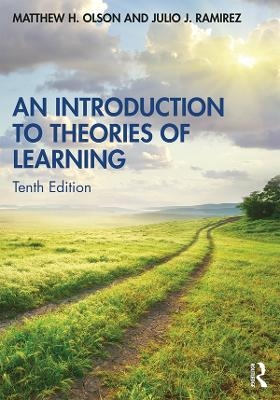
An Introduction to Theories of Learning
Routledge (Verlag)
978-0-367-85791-2 (ISBN)
Since its first edition, An Introduction to Theories of Learning has provided a uniquely sweeping review of the major learning theories from the 20th century that profoundly influenced the field of psychology. In this tenth edition, the authors present further experimental evidence that tests many of the fundamental ideas presented in these classic theories, as well as explore many of the advances in psychological science and neuroscience that have yielded greater insight into the processes that underlie learning in human beings and animals.
The four main goals of this text are to define learning and to show how the learning process is studied (Chapters 1 and 2), to place learning theory in historical perspective (Chapter 3), and to present essential features of the major theories of learning with implications for educational practices (Chapters 4 through 16). The authors retained the best features of earlier editions while making revisions that reflect current research and scholarship, including coverage of active learning and the testing effect, information for problem solving in ravens, data illustrating the neurobiological basis of the cognitive map and spatial learning, new research on brain plasticity and its role in learning as well as the impact of poverty on brain and cognitive development, and new evidence that challenges the notion of learning styles.
Complete with chapter summaries, discussion questions, and a glossary, this text is essential reading for theories of learning and applied cognitive psychology courses.
See "Support Material" below for new online resources. Instructor resources include PowerPoint slides and a testbank containing over 500 questions (in both Microsoft Word and GIFT file formats). Student resources include chapter summaries, discussion questions, and a glossary of key terms.
Matthew H. Olson was Professor and Chair of the Psychology Department at Hamline University. Julio J. Ramirez is the R. Stuart Dickson Professor of Psychology and Director of the Neuroscience Program at Davidson College.
PART I Introduction to Learning
Chapter 1: What Is Learning?
Chapter 2: Approaches to the Study of Learning
Chapter 3: Early Notions about Learning
Chapter 4: Edward Lee Thorndike
PART II Predominantly Functionalistic Theories
Chapter 5: Burrhus Frederic Skinner
Chapter 6: Clark Leonard Hull
PART III Predominantly Associationistic Theories
Chapter 7: Ivan Petrovich Pavlov
Chapter 8: Edwin Ray Guthrie
Chapter 9: William Kaye Estes
PART IV Predominantly Cognitive Theories
Chapter 10: Gestalt Theory
Chapter 11: Jean Piaget
Chapter 12: Edward Chace Tolman
Chapter 13: Albert Bandura
PART V A Predominantly Neurophysiological Theory
Chapter 14: Donald Olding Hebb
Chapter 15: Robert C. Bolles and Evolutionary Psychology
Chapter 16: A Final Word
| Erscheinungsdatum | 26.02.2020 |
|---|---|
| Zusatzinfo | 3 Tables, black and white; 72 Line drawings, black and white; 40 Halftones, black and white; 7 Illustrations, black and white |
| Verlagsort | London |
| Sprache | englisch |
| Maße | 178 x 254 mm |
| Gewicht | 997 g |
| Themenwelt | Geisteswissenschaften ► Psychologie ► Allgemeine Psychologie |
| Geisteswissenschaften ► Psychologie ► Biopsychologie / Neurowissenschaften | |
| Geisteswissenschaften ► Psychologie ► Entwicklungspsychologie | |
| Geisteswissenschaften ► Psychologie ► Pädagogische Psychologie | |
| Geisteswissenschaften ► Psychologie ► Verhaltenstherapie | |
| Sozialwissenschaften ► Pädagogik ► Allgemeines / Lexika | |
| Sozialwissenschaften ► Pädagogik ► Bildungstheorie | |
| ISBN-10 | 0-367-85791-X / 036785791X |
| ISBN-13 | 978-0-367-85791-2 / 9780367857912 |
| Zustand | Neuware |
| Informationen gemäß Produktsicherheitsverordnung (GPSR) | |
| Haben Sie eine Frage zum Produkt? |
aus dem Bereich


